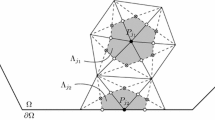Abstract
Let \(\Omega \) be a Lipschitz polyhedral (can be nonconvex) domain in \({\mathbb {R}}^{3}\), and \(V_{h}\) denotes the finite element space of continuous piecewise linear polynomials. On non-obtuse quasi-uniform tetrahedral meshes, we prove that the finite element projection \(R_{h}u\) of \(u \in H^{1}(\Omega ) \cap C({\overline{\Omega }})\) (with \(R_{h} u\) interpolating u at the boundary nodes) satisfies
If we further assume \(u \in W^{1,\infty }(\Omega )\), then
Similar content being viewed by others
Availability of Data and Material
Not applicable.
References
Brenner, S., Scott, L.: The Mathematical Theory of Finite Element Methods. Springer, New York (2002)
Ciarlet, P.G., Raviart, P.A.: Maximum principle and uniform convergence for the finite element method. Comput. Methods Appl. Mech. Eng. 2, 17–31 (1973)
Demlow, A., Leykekhman, D., Schatz, A.H., Wahlbin, L.B.: Best approximation property in the \(W_{\infty }^{1}\) norm on graded meshes. Math. Comput. 81, 743–764 (2012)
Guzmán, J., Leykekhman, D., Rossmann, J., Schatz, A.H.: Hölder estimates for Green’s functions on convex polyhedral domains and their applications to finite element methods. Numer. Math. 112, 221–243 (2009)
Korotov, S., Křížek, M., Neittaanmäki, P.: Weakened acute type condition for tetrahedral triangulations and the discrete maximum principle. Math. Comput. 70(233), 107–119 (2000)
Křížek, M., Qun, L.: On diagonal dominance of stiffness matrices in 3D. East-West J. Numer. Math. 3(1), 59–69 (1995)
Leykekhman, D., Li, B.: Weak discrete maximum principle of finite element methods in convex polyhedra. Math. Comput. 90, 1–18 (2021)
Leykekhman, D., Vexler, B.: Finite element pointwise results on convex polyhedral domains. SIAM J. Numer. Anal. 54(2), 561–587 (2016)
Natterer, F.: Uber die punktweise Konvergenz finiter Elemente. Numer. Math. 25, 67–77 (1975)
Nitsche, J.A.: \(L_{\infty }\) convergence of finite element approximations, mathematical aspects of finite element methods. Lecture Notes in Math., vol. 606, pp. 261–274. Springer, Berlin (1977)
Rannacher, R.: Zur \(L^{\infty }\)- Konvergenz linearer finiter Elemente beim Dirichlet-Problem. Math. Z. 149, 69–77 (1976)
Rannacher, R., Scott, R.: Some optimal error estimates for piecewise linear finite element approximations. Math. Comput. 148, 437–445 (1982)
Schatz, A.H.: A weak discrete maximum principle and stability of the finite element method in \(L^{\infty }\) on the plane polygonal domains. I. Math. Comput. 34, 77–91 (1980)
Schatz, A.H.: Pointwise error estimates and asymptotic error expansion inequalities for the finite element method on irregular grids: part 1. Math. Comput. 67, 877–899 (1998)
Schatz, A.H., Wahlbin, L.B.: On the quasi-optimality in \(L_{\infty }\) of the \(\acute{H}^{1}\)-projection into finite element spaces. Math. Comput. 157, 1–22 (1982)
Scott, R.: Optimal \(L_{\infty }\) estimates for the finite element method. Math. Comput. 30, 681–697 (1976)
Stein, E.M.: Singular Integrals and Differentiability Properties of Functions, Princeton Mathematical Series, No. 30. Princeton University Press, Princeton (1970)
Wang, J., Zhang, R.: Maximum principles for \(P_{1}\)- conforming finite element approximation of quasi-linear second order elliptic equations. SIAM J. Numer. Anal. 50(2), 626–642 (2012)
Funding
HG is partially supported by National Natural Science Foundation of China under Grant Numbers 11871234 and 11971010. Weifeng Qiu is supported by a grant from the Research Grants Council of the Hong Kong Special Administrative Region, China (Project No. CityU 11302718).
Author information
Authors and Affiliations
Contributions
Huadong Gao and Weifeng Qiu have participated sufficiently in the work to take public responsibility for the content, including participation in the concept, method, analysis and writing. All authors certify that this material or similar material has not been and will not be submitted to or published in any other publication.
Corresponding author
Ethics declarations
Conflict of interest
No conflict of interest exists.
Code availability
Not applicable.
Additional information
Publisher's Note
Springer Nature remains neutral with regard to jurisdictional claims in published maps and institutional affiliations.
Rights and permissions
About this article
Cite this article
Gao, H., Qiu, W. The Pointwise Stabilities of Piecewise Linear Finite Element Method on Non-obtuse Tetrahedral Meshes of Nonconvex Polyhedra. J Sci Comput 87, 53 (2021). https://doi.org/10.1007/s10915-021-01465-4
Received:
Accepted:
Published:
DOI: https://doi.org/10.1007/s10915-021-01465-4



